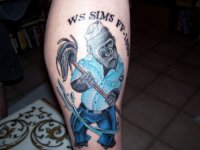- Reaction score
- 2,540
- Points
- 1,190
ModlrMike said:Yes, NPFAO is not necessarily a full time job, but there's more to NPF. You have the warehouse manager, and three bar managers as well. There's more to NPF than just handling the money, someone has to handle the stuff, and they probably shouldn't be the same person.
We have three bar managers, a warehouse manager, an NPF Clerk, an NPF Manager, and an NPF Admin Officer. The LogO doesn't technically fall within the NPF org, but because he's the NPFAO's direct supervisor in all other matters, he takes a bit of the buck, and then the buck stops with the CO.
All of these are secondary duties. However, as the NPFAO is a Class-A member, it's sort of become their "full time" job at the unit, because they don't have time for much else. They're new, so half their time is spent learning, and the other half doing, so maybe it won't be the only thing they do after they've figured it all out.


